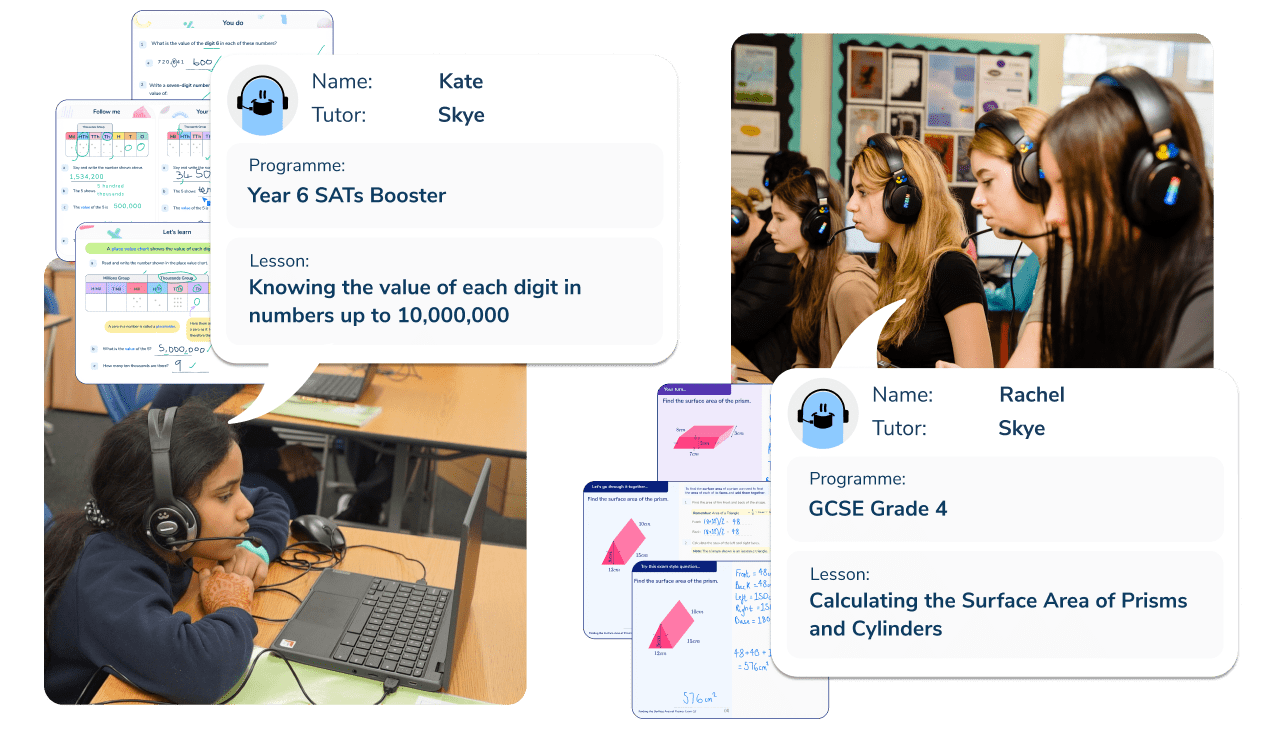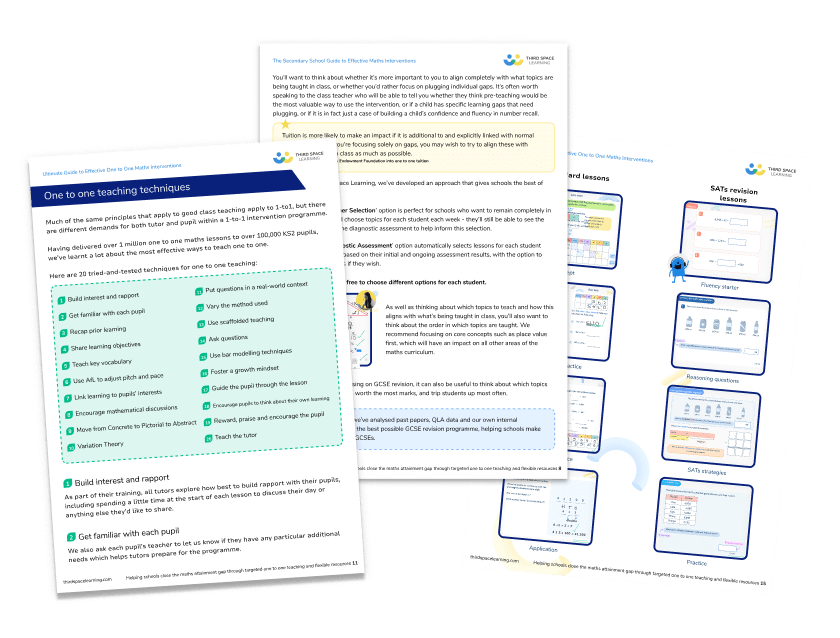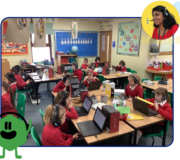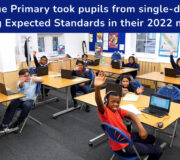EEF Trial On Affordable Online Maths Tuition
This article was first published in 2017. Both the EEF and Third Space Learning have evolved a great deal since then.
In this article, we reflect on the learnings from our involvement in EEF’s Trial On Affordable Online Maths Tuition, the improvements we made as a result of its findings and summarise more recent guidance from the EEF on effective tutoring in schools to help school leaders to monitor and evaluate the effectiveness of tuition in their own setting.
We’re not the only ones who think that the concept of affordable online maths tuition is one that has great potential. Research clearly shows the positive impact high quality tutoring has on accelerating pupils’ progress and narrowing the attainment gap. This is particularly important post-pandemic, where many children continue to require extra intervention and support with their learning.
The EEF has identified tuition as being one of the best evidenced interventions, with pupils making up to five months’ additional progress with one-to-one tuition and up to four months’ additional progress with small group tuition.
Affordable Online Maths Tuition trial with EEF
In the early days of Third Space Learning back in 2014, social impact investors Nesta (now one of our investors) and the Education Endowment Foundation (EEF) approached us to ask if we’d consider being involved in a trial of ‘Affordable Online Maths Tuition’.
The EEF run a number of trials each year into the efficacy of different interventions in education, with a particular focus on those that seek to close the social attainment gap. The results of their trials are aggregated in their popular and accessible Teaching and Learning Toolkit.
As a very early stage education startup in 2014, of course we said yes – we wanted to gain insight into how we could improve our initial teacher platform. So at the start of September 2014, as well as settling in our existing schools with their one-to-one Maths tutors we also welcomed an additional 32 EEF schools who would be taking part in the research.
The Ultimate Guide to Maths Tutoring
Learn how to choose, plan and fund the right tutoring approach for your students for maximum impact. Includes individual primary and secondary guides.
Download Free Now!Over the course of a year of face to face and telephone interviews with the participating schools, evaluators from the University of York and Durham University looked at all aspects of the intervention from set-up and ease of implementation to the quality of the tuition and the response from pupils and teachers.
The pupils chosen to receive the intervention of weekly one-to-one online Maths lessons were all Year 6 Key Stage 2 pupils in receipt of pupil premium who were to sit their SATs in May 2015. The evaluation estimated the impact of the programme by comparing the SATs results of pupils involved in the programme to a control group of pupils who received normal pre-SATs teaching in Year 6.
The results of this EEF trial were published and are available here.
The EEF report describes Third Space Learning as “an excellent holistic learning experience via one-to-one tuition that individualises learning and has the potential to accelerate it.” The impact evaluation found no evidence that the programme had an impact on KS2 Maths compared with the “business as usual” teaching and learning support in Year 6, such as schools running 1-to-1 boosters in school themselves.
However staff at most schools (15 out of 19 schools who did the in-depth survey) felt that pupils had improved attainment beyond the usual expectations due to the intervention, and described the progress of their pupils as either good or excellent.
It should be noted that this was all undertaken at a very early stage of Third Space when we were working with just 80 schools and before we made many of the improvements that make such a difference now.
We now teach pupils from 700 schools across the UK every week, and in our latest trial with Rising Stars, pupils made on average, seven months’ progress over fourteen weeks so we are looking at double progress. This is in line with what the DfE would define as a high quality intervention (2.0 progress).
Since the early stage EEF report, we’ve built out a huge swath of improvements to our school experience. These include:
Our online classroom
The EEF reported that some schools faced a small number of technical difficulties which affected sessions. At this early stage, we leased classroom software and we openly admit, it wasn’t perfect. It was designed for adults and was a bit glitchy so as soon as possible, we designed and built an online classroom designed for children learning maths.
The result is an intuitive, seamless online experience for children which also allows our tutors to personalise every lesson. One way they personalise lessons is through the concept bank which allows them to add extra scaffolding to a particular concept a child might be struggling with.
They can also award pupils effort points throughout a session, not for getting an answer correct, but for taking the correct approach to learning maths, and giving it a go. This is just one of the ways that we encourage a growth mindset in Third Space pupils.

Meet Skye, the voice-based AI tutor making maths success possible for every student.
Built by teachers and maths experts, Skye uses the same pedagogy, curriculum and lesson structure as our traditional tutoring.
But, with more flexibility and a lower cost, schools can scale online maths tutoring to support every student who needs it.
Watch Skye in actionTutor training programme
We have designed and created a tutor training programme with academics from UCL and the Institute of Education, and we wholly own and manage our tutor centre. This is a big investment in tutor quality, which ultimately leads to greatly improved sessions.
Smart diagnostic assessment
Every child is different and has different learning gaps. Even as a teacher, it’s difficult and time consuming to know exactly which pupil has which gaps and providing appropriate support in a class of 30 children is near impossible.
So, we built a diagnostic assessment solution for children to use before their first session with their tutor which helps us to find the individual gaps and misconceptions that each child has. We use this to create a personalised lesson journey which ensures every child receives 1-to-1 support on areas that they need support.
Pupil feedback
The report also stated that “schools were confident that the tuition was beneficial for their pupils’ outcomes in terms of improved comprehension, capacities, verbal fluency and confidence in Maths.” This is an area that we have measured consistently over the last 5 years and have seen great impact.
For example, in Autumn 2018, we conducted a study into how our interventions affect a pupil’s affective domain. We found that pupils make improvements in confidence, value, effort and enjoyment of maths. Most importantly, they make the largest gains in their greatest areas of weakness, helping us to create confident, able mathematicians.

This view has been corroborated by teachers over the last few years, such as Jane Powell, Assistant Headteacher at Barton Seagrave Primary School who said that Third Space Learning “provides the opportunity for a large number of children to engage in bespoke maths tuition at the same time and the personalised objectives mean that everyone is working at the right level.
The children are engaged throughout the session and are more willing to acknowledge their weaknesses with a stranger than they might be in the classroom with their peers”. We even saw this in the feedback from the EEF report in which teachers were generally enthusiastic.
One said that “the programme was really positive in terms of the outcomes… I think it’s helped dramatically… and I think the SATS results will reflect that because I think they’ve jumped levels.”
The pupils shared this view on academic impact “I did better in my SATs because of it… because I knew more things”.
Almost equally important for us, however, as a reflection of our ethos and philosophy of learning were the reports of the confidence and attitudinal changes provided by the one-to-one Maths tuition.
“It made me feel very happy that I’ve got someone there beside me to help me get through it. And [it’s different] with the teachers in class [who] are all rushing about to help other people. So if you’re stuck you can ask [the tutor] for help and she’ll just jump on it straight away and help you.”
From our perspective, our participation in the EEF trial was a very positive experience and we’d recommend it to any other education business.
We received a unique insight into how schools perceive one-to-one tuition, what makes a successful experience for school and pupil, what gets in the way of a pupil making the best progress on the programme, and how we could improve our offer. We then implemented this feedback which has helped to make a significant difference to more than 60,000 pupils across the UK.
EEF tutoring report summary
In 2022, EEF published ‘Making a difference with effective tutoring’ – a report investigating tutoring and effective practice.
The report identified three key principles for a tutoring programme to be successful:
- Creating a sustainable tutoring model.
- Selecting pupils and scheduling sessions effectively.
- Aligning tutoring with curriculum and assessment.
Below, we’ve summarised these principles and included the questions posed by the EEF in its tutoring report to help school leaders to monitor and evaluate the effectiveness of tuition in their own setting.
Selecting pupils and scheduling sessions effectively
- Evidence shows that the greatest impact from tutoring occurs when sessions are:
- Frequent (three times a week);
- Last up to an hour;
- Take place over a period of six to twelve weeks.
- Note: If tutoring takes place during lesson time, it is essential that the effect of tutoring at a minimum compensates for any time out of class.
- Although one to one tutoring has the most evidence-based efficacy, studies have found that tutoring in groups of up to three children can also have high impact. However, as the group size increases to over six or seven, the effectiveness reduces noticeably.
- It is essential that tuition is timetabled carefully, with these factors taken into account. Think about where the sessions will take place, to ensure they start and end promptly and try to maintain consistency with the tutor and the groups.
The EEF’s key questions for school leaders:
- Have we focused on pupils eligible for Pupil Premium Funding?
- How frequent should sessions be? When should they take place?
- How long should tuition last for?
- What size of group works best? How should I group pupils?
At Third Space Learning, we believe the more personalised a tutoring programme is, the more beneficial it is to the students. All of our sessions are one to one with each student receiving their own personalised programme based on their individual learning needs, delivered by Skye, the AI tutor.
In the EEF report, it discusses the potential stigma of tutoring if a child is tutored alone. Small group tuition reduces the likelihood of this stigma and one of the reasons schools use Third Space Learning is because we can tutor 10-20 pupils at a time, in the same location. It’s a very efficient use of resources as each pupil is connected online to their individual tutor.
All of our sessions take place online using our online interactive classroom and a headset which helps students to ask questions and address misconceptions in a safe learning environment. This approach allows us to offer one-to-one tuition to a large group, removing intervention related stigma altogether.
We provide schools with lots of flexibility over the scheduling and times of tutoring sessions so that tuition can complement the school timetable and have minimal impact on class time. Our customer support team is always on hand to provide support to ensure that your sessions run smoothly.
Aligning tutoring with the curriculum and assessment
- Evidence shows that targeted tuition, which makes use of diagnostic assessment, is likely to be the most effective.
- Tutoring should be targeted in the following ways:
- Addressing specific pupil misconceptions
- Adjusting the level of challenge or activities
- Ensuring specific concepts or topics are retaught as necessary
- Realigning the curriculum materials in the medium and longer term
- Pupils’ needs can be identified through ongoing quizzing and questioning during tutoring sessions.
- Hinge questions are a quick, simple way to effectively assess pupils. These are key questions, often multiple choice, which identify whether a pupil has understood a concept. They are designed to enable teachers to see why pupils have made an error, in any questions they have answered incorrectly.
The EEF’s key questions for school leaders:
- Which staff are most appropriate for tutoring? What support and training do tutors need to ensure maximum impact?
- How do we align tutoring content with the rest of the curriculum? How do we communicate with tutors?
- How do we support transition out of tutoring sessions? How do we create a healthy feedback and (feed-forward) loop?
Our intervention programmes have been created by our team of maths specialists and former teachers to ensure that they align with the UK national curriculum and employ the latest educational research.
Students sit carefully designed diagnostic assessments which identify areas of development, before our online programme creates a bespoke series of lessons to meet the students’ individual learning needs. Our lessons are carefully sequenced to precisely target misconceptions and allow students to build on previously acquired knowledge to become confident mathematicians.
Following each session students are asked to complete a couple of multiple choice questions designed to test understanding. The results of these questions help with progress tracking and allow subsequent tutor sessions to be adapted as required.
Creating a sustainable tutoring model
- For a tutoring programme to be successful, it’s important for schools to consistently monitor and evaluate the impact of tutoring.
- Challenges may arise, such as sessions being missed or topics not aligning with what is happening in the classroom, so it is important to continually monitor and adapt. Monitoring can include:
- Observations and learning walks.
- Review of planning.
- Staff and pupil feedback (interviews, surveys and focus groups).
- Parent/carer surveys.
- Attendance data.
- Samples of pupils’ work.
- Assessment data.
- One of the keys to success of tutoring is ensuring tutors take time to build relationships with pupils and understand their needs.
- Positive relationships between tutors, pupils and parents/carers is a key factor in ensuring pupils’ ongoing participation.
- The EEF found that getting tutors and pupils to find common ground at the start of a block of tutoring could boost attendance at sessions.
The EEF’s key questions for school leaders:
- What evidence can I gather to ensure we understand whether our approaches to tutoring are being successful?
- Is there a check-in process in place with tutors, so that we can identify any issues with attendance, tuition groupings and progress?
- How can positive relationships between tutors and pupils be established and maintained? How can we involve parents/carers in the process?
At Third Space Learning, the quality of tutoring is paramount, and the expertise of teachers and maths specialists is embedded in Skye, the AI maths tutor. Skye is built on the same curriculum and pedagogical principles used by the company’s traditional tutors, drawing on over a decade of tutoring data.
Skye is continually monitored and developed to ensure that every minute of tutoring time is of the highest quality for your pupils. This ongoing refinement uses real student data and teacher feedback to improve Skye’s conversational guidance and accent recognition, maintaining a high standard of support.
The AI tutor, Skye, is designed to create a supportive learning environment where pupils feel engaged and receive the help they need.

For tuition to have the greatest impact, the approach taken by each setting needs to be carefully thought out and structured. With the evidence and findings from the EEF tutoring report, it is clear that there can’t be a ‘one-size fits all’ approach towards tuition across all schools.
The schools that have had the greatest success with tutoring often work with a mix of providers depending on the needs of the individual child. For some pupils with severe needs, one to one, face to face tutoring may be the only option, however for other pupils who just need a quick refresher on a single topic, they can work in small groups. For those with a few to many gaps on different topics – which is the majority of students – they will be best served by one to one maths tutoring, such as that provided by Skye with Third Space Learning.
The potential impact of tutoring on student outcomes and progress is significant, providing school leaders take time to carefully plan the tuition programmes. In addition to the cognitive benefits, the positive benefits to pupil well-being and confidence are clear.
DO YOU HAVE STUDENTS WHO NEED MORE SUPPORT IN MATHS?
Skye – our AI maths tutor built by teachers – gives students personalised one-to-one lessons that address learning gaps and build confidence.
Since 2013 we’ve taught over 2 million hours of maths lessons to more than 170,000 students to help them become fluent, able mathematicians.
Explore our AI maths tutoring or find out about online maths tuition for your school.







![Effective Praise In The Classroom: What Works & What Doesn’t [FREE Praise Certificate]](https://thirdspacelearning.com/wp-content/uploads/2022/06/OG-effort-points-blog-image-180x160.jpg)